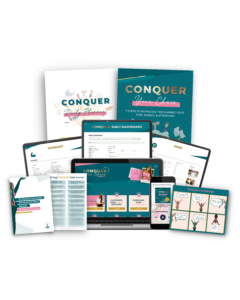Find out the reasons why your own routine does not work well with you.
Monday is approaching and unlike Mondays in the past, you’re pumped because you’ve vowed to make some changes.
You were recently inspired to take control and start a new morning routine and your start day is Monday!
Monday rolls around and you’re ready. You went from sleeping in till 8:50AM to committing to a 5:00AM wake up call. It’s a little rough, but your adrenaline kicks in and you roll out of bed to start the routine you borrowed from a book.
As you matriculate through the morning, you feel really great. You have this innocent little smirk on your face because you feel like you’ve cracked the code to mastering your mornings, and there’s something satisfying about the fact that the people in your world are still sleeping.
As you begin to wrap up your morning and start your day, you feel accomplished. You did it!
The next morning comes and you do it again, this time feeding off the energy of yesterday. Then, midweek hits, your alarm goes off and you’re like…
”Just a few more minutes…”
The steam is definitely cooling off and you know it. A few minutes past, then an hour, and before you know it you’re back at the wake up time from last week and it’s disheartening.
Today feels like a failure and so you grant yourself permission to abandon the whole goal because of one setback…
Sound familiar?
Maybe you can’t relate to this exact scenario, but how many times have you committed to a new way of doing things only to falter a few days in?
It’s so incredibly common. You’re not alone.
I’ve seen good, ambitious, goal-oriented people with the best intentions fall victim to the challenges of implementing new routines.
While there can be many factors at play, I’ve found there are 3 common reasons why people can’t seem to stick with new routines:
SN: This is based on my observations as a Productivity Coach, not on scientific data.
Reason #1: Blindly adopting the routines of others without ensuring it matches your 3 P’s.
Listen, I’m a fan of books like “The Miracle Morning” by Hal Elrod and “The 5AM Club” by Robin Sharma. Those books have transformed millions of lives. I love the occasional blog post or podcast about some famous person’s routine just as much as the next person, BUT…
And there is a BUT. Just because these books and articles shine light on what works for other people, doesn’t mean it will work in the same way for you. What got them there will not necessarily get you there.
People share the routines that have helped them become successful, but what we don’t see are their teams, systems, and budget. All of which will differ from yours. There are aspects of their lifestyle and business that are different from yours and if you know that then you know why copying everything they do can’t possibly work for you.
This doesn’t mean we can’t look up to these people or take a page out of their book. It simply means we have to take the time to ask ourselves:
”What do my personality, passions, and purpose tell me about how I should design my daily routines?”
It’s about self-reflection and awareness. They likely have a strong WHY attached to their routines and you should too. A “WHY” for a routine can’t be, “because it works for Warren Buffet.” That why is not strong enough to weather the struggles of the how.
Instead of blindly adopting the routines of people we admire, the best thing we can do is design and customize routines that match our personality, passions, purpose, and overall natural rhythms.
That’s what will get you there.
Reason #2: Allowing setbacks to hijack all of your progress.
Talk about self-sabotaging behavior. I’ve been guilty of this so many times in my life (mainly when it comes to establishing new eating habits and routines).
Setbacks should be treated as one-time events from which we strive to quickly recover. They are not meant to be a period, but rather a comma in our journey.
So many of us grant ourselves permission to throw the whole damn goal away when we mess up once or twice and that’s not okay.
Progress over perfection should be the goal. When consistency becomes difficult to maintain, we should ask ourselves:
”What can I do to make consistency achievable?”
You’ll find that solutions like built-in accountability and anchoring new habits to existing ones is a great start.
What we want to avoid is having this reflection time turn into a pity party or a sparring session. There is nothing to be gained from beating ourselves up about falling short. The best thing we can do is make a plan to reduce the odds of it happening again. That’s a far more productive use of time.
Wouldn’t you agree?
Allowing setbacks to constantly hijack your goals is a recipe for continued stagnation. You’re better than that and giving up on becoming the best version of yourself is not in the cards. Not today SATAN! Not TUHDAY!.
Reason #3: Going in way too hot, instead of treating the transition as a process.
”I’m coming in hot, hot, hot, hot…” that song is stuck in my head as I contemplate this reason.
Here’s the thing:
When we’ve made the commitment to implement a new routine or habit we fall drunk in love with the end result. That vision of what could be if we just stick with it leads us to biting off way more than we can chew.
Before you know it, we’ve abandoned old routines and habits col turkey and replaced with our new one, but truthfully only a small percentage of the population can just quit something cold turkey.
I’ve found that those who can have strong ass “whys” that sustain them. Beyond that, cold turkey approaches are destined to fail due to our inherent nature. Again, my opinion, not backed by science. Although, I’m sure there are studies that support my claim.
Instead of going all in and implementing drastic changes all at once, why not ease into it. Make it a process.
I know why we don’t do it.
We live in a world of instant gratification. We believe the quicker we implement change, the faster we’ll reap the benefits of said change. I get it, but when we choose NOT to pace ourselves we fall much harder.
Perhaps, now is the time to start glorifying incremental progression over instant transformation. There’s no magic pill or potion for anything we want in life.
Allow yourself to slowly transition into your new routines and habits and celebrate the small wins along the way.
That’s much more sustainable long term and quite frankly, a lot less painful.
All that said, implementing new routines and habits can work for you. You just have to avoid blindly adopting the routines of others, stop allowing small setbacks to hijack your goals, and choose incremental progression over instant gratification.
It’s obviously easier said than done, but it can be done.
If I can add one more tip for ensuring you’re successful with new routines, it would be to get yourself a bombdotcom Accountability Partner who truly wants to se you win.
Accountability can be a secret weapon for a lot of people.

If you’re ready to start customize your rebel routines and stay consistent, enroll in The CONQUER Your Chaos Crash Course Test Drive. It’s the first step to reclaiming your time, energy, and attention so you can get the right things done, at the right time, for the right reasons, in the right way for you.






BE THE FIRST TO COMMENT